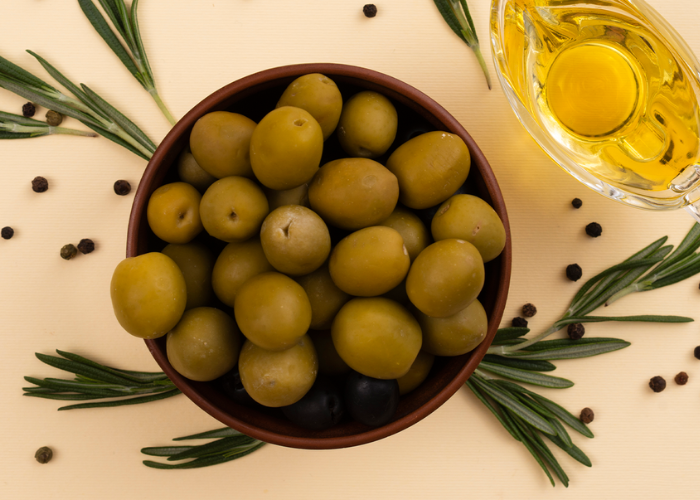
Wellhealthorganic.com:11-Health-Benefits-And-Side-Effects-Of-Olives-Benefits-Of-Olives
Olives are a delicious and nutritious food item that can be incorporated into many different dishes. They are a good source of healthy fats, vitamins, and minerals and can help reduce inflammation and the risk of certain types of cancer.
Health Benefits of Olives
Olives are a superfood that offers numerous health benefits. Rich in monounsaturated fatty acids, antioxidants, and vitamins, olives are a great addition to any diet. They contain essential nutrients that can help promote heart health, reduce inflammation, and even help prevent cancer. Also, olives are a great source of fiber, which can help keep you feeling full and satisfied for longer. The health benefits of olives include improved cholesterol levels, a boost in antioxidants, anti-inflammatory properties, and protection against various diseases. These are also low in calories and have a low glycemic index, making them a great weight-loss choice. Finally, the fat content in olives can help reduce cravings and keep you fuller for longer. While eating olives has many benefits, it is important to remember that they can also have some side effects. Eating too many olives can lead to an upset stomach and indigestion, and the high salt content can increase blood pressure. Also, olives may interact with certain medications, so checking with your doctor before consuming them is important.
Nutritional Benefits of Olives
This is a nutrient-dense food packed with powerful health benefits. They contain various vitamins and minerals, including vitamin E, potassium, and iron. Olives are also an excellent source of dietary fiber, which can help to improve digestion and reduce cholesterol levels. In addition, olives are rich in monounsaturated fatty acids, which can help to reduce the risk of heart disease. it also contains polyphenols, which are antioxidants that may offer protection from chronic diseases, including cancer. Furthermore, olives can help to boost the immune system, reduce inflammation, and provide anti-aging benefits. These health benefits make olives an excellent choice for improving their overall health.
Possible Side Effects of Olives
Although olives are generally considered a very ealthy food, they can have some side effects. Olives contain high sodium levels, which can cause high blood pressure or other cardiovascular issues. Eating too many olives can also lead to weight gain and digestive discomfort. Some may also find that olives can cause headaches or other allergic reactions. It is important to note that the side effects of olives vary from person to person and that it is important to discuss any concerns with a medical professional before incorporating olives into the diet.
Research on the Benefits of Olives
Recent research has shown that olives and olive oil contain abundant beneficial compounds associated with health benefits and potential therapeutic effects. Olives are an excellent source of vitamins E, A, and K and a good dietary fiber source. They contain polyphenols, an antioxidant that may help reduce inflammation, protect cells from damage, and reduce the risk of developing certain chronic diseases. Research has also shown that olive oil can help lower cholesterol and triglyceride levels, reduce blood pressure, and improve cardiovascular health. Also, olive oil may help reduce the risk of certain types of cancer, including breast, colorectal, and prostate cancer. Finally, olives may also have anti-bacterial and anti-fungal properties, making them a helpful addition to a balanced diet.
Other Considerations
Despite the many health benefits of olives, it’s important to note that they can also pose some risks. Olives are high in sodium, leading to high blood pressure and other cardiovascular problems if eaten excessively. They are also high in fat, with most of it being the healthy mono- and polyunsaturated variety. However, they can still add to calorie intake and should be eaten in moderation. Also, olives contain compounds such as oleuropein and tyrosol, which may have potential health benefits, but the research is still ongoing. Finally, olives can interact with certain medications, so speaking to a doctor before adding them to the diet is important.
Ways to Enjoy Olives
One of the great ways to enjoy the health benefits of olives is by incorporating them into your diet. Olives can be used in various dishes, such as salads, sandwiches, and pasta dishes. You can also enjoy olives as a snack or topping on pizza and other dishes. Olives can also be used to make olive oil, which can be used for cooking or added to salad dressings and marinades. Olives are also a great addition to tapenades, popular Mediterranean spreads. It can also be used to make tapenades or garnish for other dishes. No matter how you choose to enjoy olives, you’ll surely reap the health benefits of this versatile fruit.
Risks of Eating Olives
Eating olives comes with certain risks that should be considered when consuming them. Olives are high in sodium, increasing the risk of high blood pressure and other cardiovascular diseases. Also, olives can contain large amounts of saturated fat, which can be unhealthy when eaten excessively. it may also contain high levels of histamine, which can cause an allergic reaction in some people. Finally, olives can contain high levels of oxalates, which can interfere with the absorption of certain minerals and lead to kidney stones. It’s important to consider these risks when consuming olives and to eat them in moderation.
Tips for Eating Olives
Eating olives can be a great way to include the health benefits of olives in your diet, but it is important to remember some tips to ensure you get the most out of your olive consumption. Firstly, choose ripe and ready-to-eat olives, which will contain more beneficial nutrients. Secondly, you may want to opt for various olives, such as green and black, as they offer different nutritional benefits. Finally, olives can be consumed fresh, canned, or jarred, but the latter two contain more salt, so keep an eye on your sodium intake. Adding olives to your meal can greatly increase the flavor and nutrient content, so be sure to include them in your diet.
Conclusion
These are a great health food that offers a variety of benefits. They are high in essential vitamins, minerals, and antioxidants, which can help protect against various health conditions. Olives are also low in calories, making them a great snack for those trying to lose weight. While olives may be high in fat, it is mostly monounsaturated fat, considered healthier than other types of dietary fat. However, it’s also important to note that olives can be high in sodium, so they should be consumed in moderation. Also, olives can have side effects, including digestive issues and allergic reactions. To ensure you reap all the health benefits of olives, it’s best to talk to your doctor before adding them to your diet.




